
Renewable energy and infrastructure solutions provider Gibraltar Industries (NASDAQ: ROCK) fell short of the markets revenue expectations in Q3 CY2025, with sales falling 13.9% year on year to $310.9 million. The company’s full-year revenue guidance of $1.16 billion at the midpoint came in 0.9% below analysts’ estimates. Its non-GAAP profit of $1.14 per share was 5.8% below analysts’ consensus estimates.
Is now the time to buy Gibraltar? Find out by accessing our full research report, it’s free for active Edge members.
Gibraltar (ROCK) Q3 CY2025 Highlights:
- Revenue: $310.9 million vs analyst estimates of $317.5 million (13.9% year-on-year decline, 2.1% miss)
- Adjusted EPS: $1.14 vs analyst expectations of $1.21 (5.8% miss)
- Adjusted EBITDA: $51.4 million vs analyst estimates of $56.67 million (16.5% margin, 9.3% miss)
- The company dropped its revenue guidance for the full year to $1.16 billion at the midpoint from $1.18 billion, a 1.1% decrease
- Management lowered its full-year Adjusted EPS guidance to $4.25 at the midpoint, a 1.7% decrease
- Operating Margin: 12.8%, in line with the same quarter last year
- Free Cash Flow Margin: 15.6%, similar to the same quarter last year
- Market Capitalization: $1.98 billion
“Our third quarter results reflect our focus on execution in a dynamic business environment, particularly in residential roofing, where our building accessories business posted 2% growth in a market that was down 5% - 10% depending on the channel. In our Agtech business, a large controlled environment agriculture (CEA) project was delayed as expected and impacted revenue in the quarter. On adjusted net sales growth of 13%, adjusted EPS came in slightly below prior year, impacted by both business and product mix. Backlog increased 50% in the quarter and operating cash flow grew 39% to $57 million,” stated Chairman and CEO Bill Bosway.
Company Overview
Gibraltar (NASDAQ: ROCK) makes renewable energy, agriculture technology and infrastructure products. Its mission statement is to make everyday living more sustainable.
Revenue Growth
Reviewing a company’s long-term sales performance reveals insights into its quality. Any business can put up a good quarter or two, but many enduring ones grow for years. Over the last five years, Gibraltar grew its sales at a sluggish 2.5% compounded annual growth rate. This fell short of our benchmarks and is a poor baseline for our analysis.
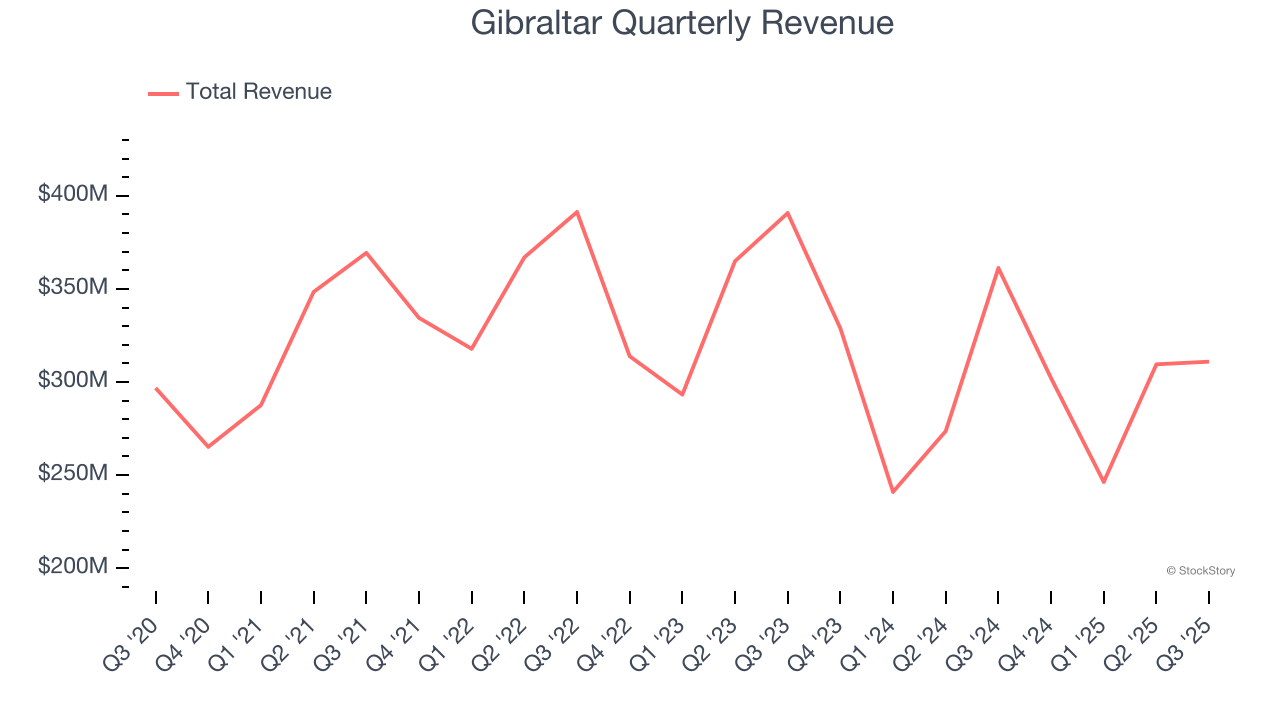
Long-term growth is the most important, but within industrials, a half-decade historical view may miss new industry trends or demand cycles. Gibraltar’s performance shows it grew in the past but relinquished its gains over the last two years, as its revenue fell by 7.4% annually. 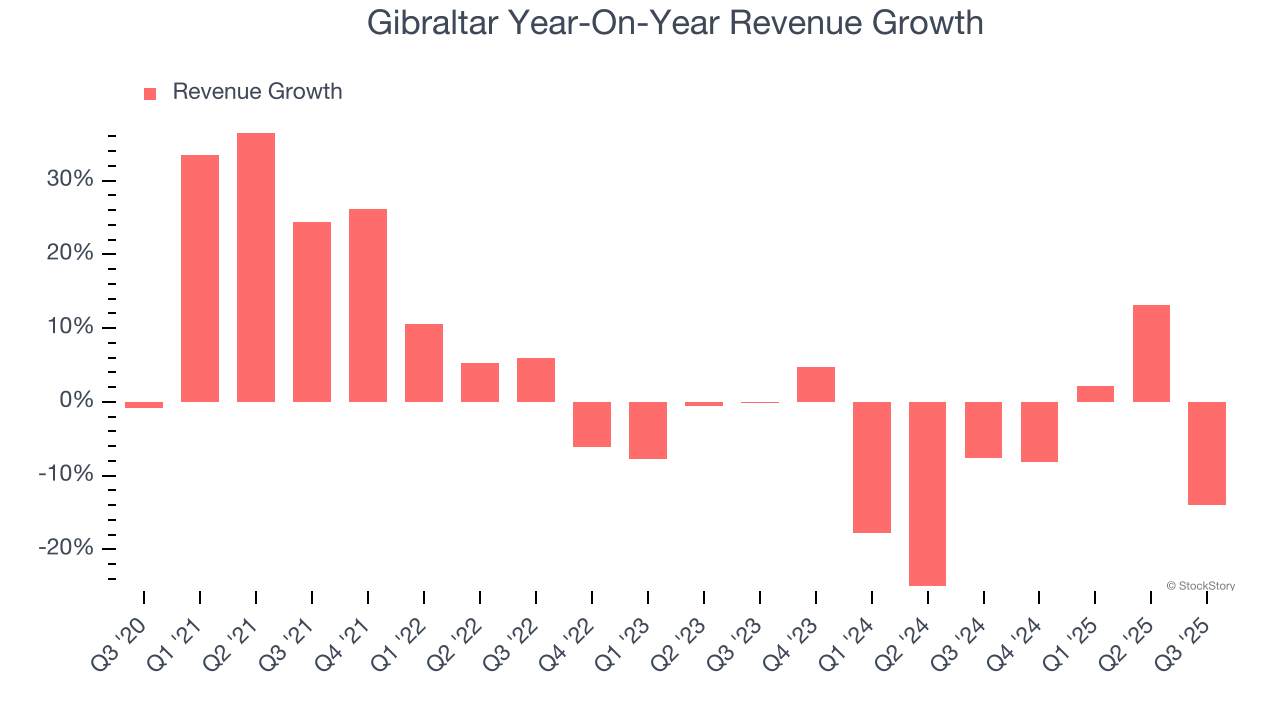
This quarter, Gibraltar missed Wall Street’s estimates and reported a rather uninspiring 13.9% year-on-year revenue decline, generating $310.9 million of revenue.
Looking ahead, sell-side analysts expect revenue to grow 5.4% over the next 12 months. Although this projection indicates its newer products and services will fuel better top-line performance, it is still below the sector average.
Unless you’ve been living under a rock, it should be obvious by now that generative AI is going to have a huge impact on how large corporations do business. While Nvidia and AMD are trading close to all-time highs, we prefer a lesser-known (but still profitable) stock benefiting from the rise of AI. Click here to access our free report one of our favorites growth stories.
Operating Margin
Gibraltar has managed its cost base well over the last five years. It demonstrated solid profitability for an industrials business, producing an average operating margin of 11.1%. This result was particularly impressive because of its low gross margin, which is mostly a factor of what it sells and takes huge shifts to move meaningfully. Companies have more control over their operating margins, and it’s a show of well-managed operations if they’re high when gross margins are low.
Looking at the trend in its profitability, Gibraltar’s operating margin rose by 3.5 percentage points over the last five years, as its sales growth gave it operating leverage.
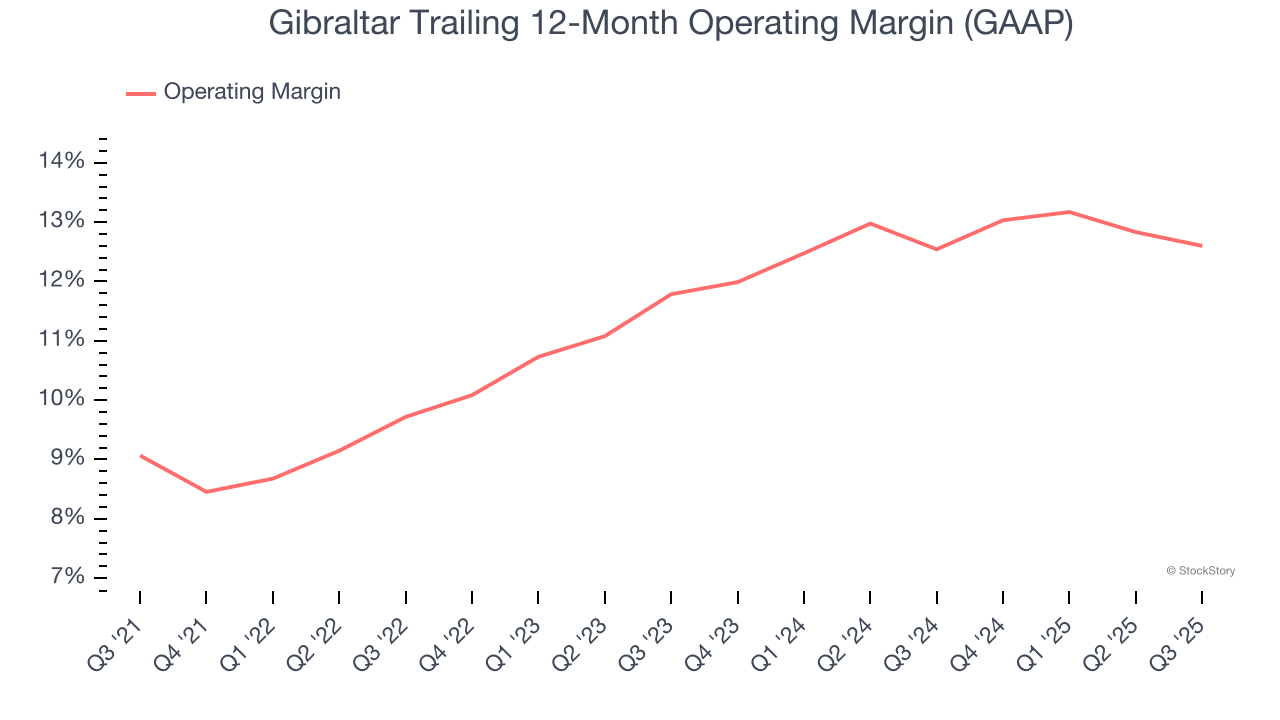
This quarter, Gibraltar generated an operating margin profit margin of 12.8%, in line with the same quarter last year. This indicates the company’s cost structure has recently been stable.
Earnings Per Share
Revenue trends explain a company’s historical growth, but the long-term change in earnings per share (EPS) points to the profitability of that growth – for example, a company could inflate its sales through excessive spending on advertising and promotions.
Gibraltar’s EPS grew at an unimpressive 7.2% compounded annual growth rate over the last five years. On the bright side, this performance was better than its 2.5% annualized revenue growth and tells us the company became more profitable on a per-share basis as it expanded.
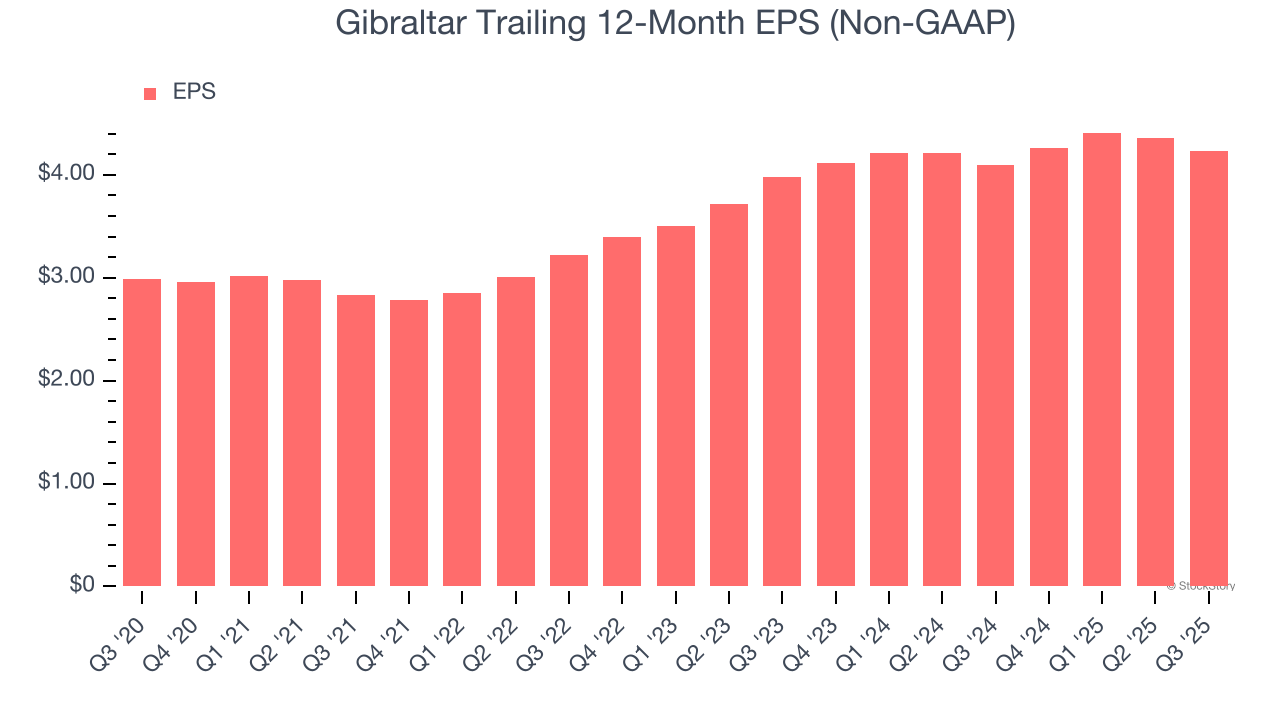
Diving into the nuances of Gibraltar’s earnings can give us a better understanding of its performance. As we mentioned earlier, Gibraltar’s operating margin was flat this quarter but expanded by 3.5 percentage points over the last five years. On top of that, its share count shrank by 9.4%. These are positive signs for shareholders because improving profitability and share buybacks turbocharge EPS growth relative to revenue growth. 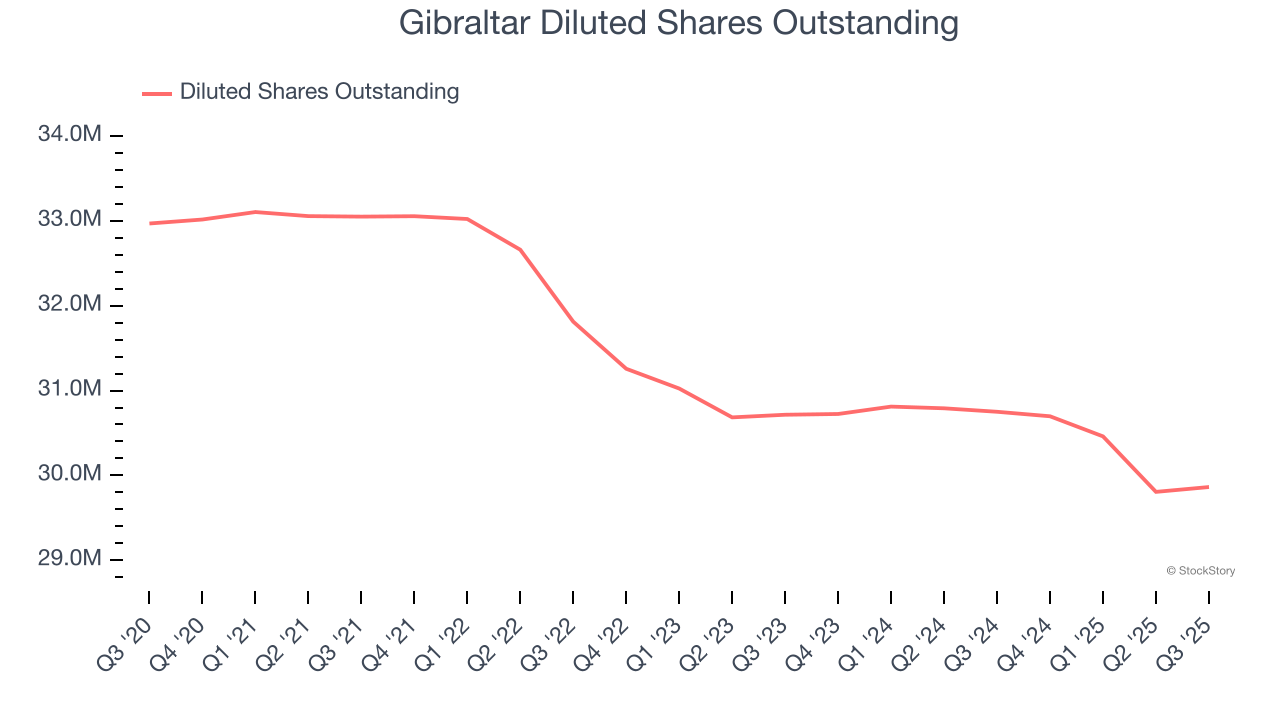
Like with revenue, we analyze EPS over a shorter period to see if we are missing a change in the business.
For Gibraltar, its two-year annual EPS growth of 3.1% was lower than its five-year trend. We hope its growth can accelerate in the future.
In Q3, Gibraltar reported adjusted EPS of $1.14, down from $1.27 in the same quarter last year. This print missed analysts’ estimates. Over the next 12 months, Wall Street expects Gibraltar’s full-year EPS of $4.23 to grow 9.5%.
Key Takeaways from Gibraltar’s Q3 Results
We struggled to find many positives in these results. Its revenue missed and its EPS fell short of Wall Street’s estimates. The company also lowered full-year guidance for both revenue and EPS, which is never a positive. Overall, this quarter could have been better. The stock traded down 3.3% to $64.87 immediately following the results.
Gibraltar didn’t show it’s best hand this quarter, but does that create an opportunity to buy the stock right now? We think that the latest quarter is only one piece of the longer-term business quality puzzle. Quality, when combined with valuation, can help determine if the stock is a buy. We cover that in our actionable full research report which you can read here, it’s free for active Edge members.





